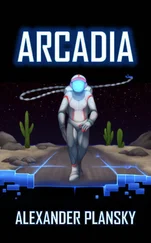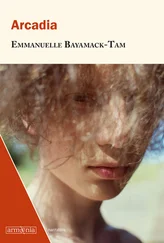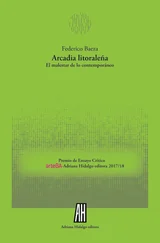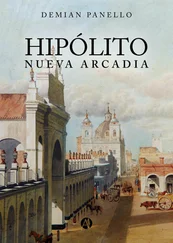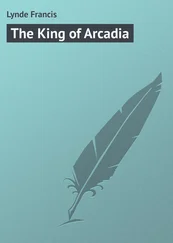During the rainstorm, the wind in the trees sounds like panting. Bit remembers what Titus used to call his own spells of sadness: the old black dog . How appropriate: fanged and servile, neither wild nor human, but an odd by-product of civilization, hungry and slinking near. He can almost see the dog out in the wild rattling rainstorm, skulking in the blacker shadows among the trees. He can almost feel the softness of its pelt under his hand.
Grete has filled six of Hannah’s skin-thin teacups with water and daisies. They shine in the dawn. These days, they use the antique lace tablecloth and the silver service at every meal. It comforts Hannah to handle things her own mother and grandmother touched.
While Luisa changes the bedsheets, Bit and Hannah are alone.
Hannah peers urgently at the computer. When the voice comes on, it says with gentle calm, My little Bit. Will you forgive me?
Bit’s silence, born of surprise, stretches. Forgive what, exactly? Which of her many failures is she speaking of?
He stares at the claw of her hand until he somehow knows she means Arcadia, their common wound, how she had pushed toward perfection but, tiring, turned away. It is true that most of the children of Arcadia rebelled. Dylan went neocon, Cole became punk, Jincy searched for suburbia, Leif turned antiseptic and inward. It’s the ancient story: the deliberate rejection of what gave birth to the youth and created the man. In the quiet of the house, Luisa’s shoes squeak around the bed, the mockingbird begins a rill.
Bit feels it start to swell in him. The love, which he had turned from, breathes, blinks, swallows. A creature, stirred back to life. He can’t be separate. It is impossible. He is part of the whole.
He looks at his brittle mother and says, There is nothing to forgive.
Within the rebellious clay of her flesh, Hannah kindles, becomes so unbearably brilliant that it hurts Bit to look at her. Still, he keeps his eyes on her. He looks.
Hannah had once been vaster than Arcadia itself, her body so big it enveloped him, the warmth of her, the bread of her, so great that the sun had risen and set in her. Dwindling, she is a burlap sack and bundle of sticks; she is frayed muscles, weeping sores.
He carries her into the Pond. She dabbles her hands and legs, pretending to swim. They hear Grete’s fast footsteps as she runs up. She wades in, still in her clothes, the jeans and boat shoes, the pretty top. She goes underwater and comes up next to them, her hair plastered and eyeliner streaming in black slips down her cheeks. She says, Let me, and carries Hannah away through the water toward Helle’s rock. When she turns around, she is singing the song that Bit used to sing to her, the summers they spent up in Arcadia, when she was little and frightened of the thick water of the Pond. . swimming all day, In the ocean so wide, Now it’s time to rest, And float with the tide, Hey ho, little fish don’t cry , she sings.
Luisa is calm but pushes through the countryside at such speeds that Bit is afraid of the trees rushing by in the darkness. Bit holds his choking mother. They are in the ER. In a moment, the doctor in his green scrubs brandishes a scalpel and Hannah has a hole in her throat. Cotton descends upon Bit’s mind. For a long, good time, there is blankness.
They wheel Hannah out again. There is a ventilator attached to her. She is weeping. I didn’t want this, she will say at home, clawing at the tubes; but it’s clear, even now, what she means. Luisa says something: refused to talk about advance directives. Hannah. Bit finds himself in the car, going home.
He can administer enemas, hold his mother one-armed over the toilet, wipe her bottom. He can brush the shine into her long whitening hair and file her toenails and rub the muscles that cramp until she gasps with relief. He can spend all his patience from dawn to dusk spooning soup into her mouth which she chokes on more often than not. Even in the hospital, when they asked her about a feeding tube, she had been so agitated they understood her No. He can watch her waste away. To make peace with the problems of her flesh is not hard for him. But something deep in him resists the raw wound in her throat, the way it smells of death.
He watches his hand clean it, anyway. He has locked himself away so that his days are lived by a shred of himself. The rest of him waits somewhere on the outskirts, watching for the end.
But Hannah studies the part of Bit that remains. She is expanding while he is retracting. She is a cup. She overbrims with love.
Hannah cannot swallow her food. She chokes and lets it dribble from her mouth. Bit remembers a story, somewhere, of a woman bricked into a wall. This is his mother, interred alive.
Ellis kneels at Hannah’s side. She isn’t sleeping, either: she is pale, her face drawn in the sun. Bit hears among the murmurs, starvation. . feeding tube.
No, the computer voice says cheerily. I am glad to have had these months. It was right. But I am almost done. Let me starve.
Ellis lays her brown cheek on Hannah’s hand. You’re right. It’s a gentler way to go, Hannah, she murmurs. We’ll give you opioids and keep you comfortable. As long as you’re still happy with this decision.
Hannah’s eyes dart at Bit. The computer sings out, I am happy, now, to go.
The women tighten, a knot, around Bit’s small family. Luisa and Grete, always; Glory every afternoon. This morning, thumbing their noses at the quarantine, Cheryl and Diana, the Library Ladies. Grete is gone for hours on her runs. When Ellis arrived the night before, she held her soft cheek on his, and he could feel the pulse of her, the promise. Such terrible timing, to find what he had been hoping for, now. She had put her things in his closet, and slipped into his sheets, her body cool as a salve. When he rose to get a glass of water, he’d heard Grete in her room whispering into Otto’s patient ruff.
Before lunch, Astrid, alerted by Grete, sweeps in. Bit doesn’t see her at first, but he feels the house fill with her cold blue flame. Then she is cupping his cheeks in her callused hands. She kisses him on the forehead, and he wears the kiss for the rest of the day like a badge.
Cooking, tending, cleaning: omnipresent like flies, the hands of women.
When it is overmuch, he goes to the Pond and submerges himself in the too-warm water. The weeds grab and slide against him. A hawk watches him from a branch, a blue jay in its talons. When Bit proves innocuous, the hawk bends its head to the bird and down confettis onto the surface of the water. Small blue feathers stick to Bit’s skin when he climbs out.
On his walk back, he sees a man sitting on Scott and Lisa’s porch. Even from a distance, Bit can see the man is Amish: full-clothed in the heat, suspenders black against a white shirt. Bit approaches warily. The man stands and nods, and his beard wags. He’s fair-haired with rosy cheeks and shoulders so square they could be hewn from oak. Bit had seen him on Glory’s arm at Abe’s service; her husband. When Bit nears, the man’s eyes begin to twinkle. He makes a little pinching motion with his fingers and brings it to his lips. If Bit didn’t know better, he would say that it was the universal sign of a toke.
I’m sorry? he says.
Amos, the man says, pointing at his chest. He makes the sign again, then a motion that could only mean waterfall. And it returns to Bit like a slap, the day at the end of Arcadia, Ike and Cole and he in the waterfall, the two Amish boys stepping out of the twilit woods, the crouching around the campfire, the joint. This must be one of those boys.
Bit gapes in astonishment. The man looks around and winks. Then he makes the toke sign again. One minute, Bit says. He walks through the back door and rummages in Abe’s office until he finds the tennis ball he knows would be there.
Читать дальше
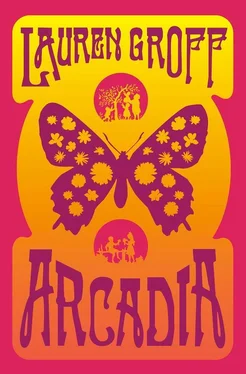
![Andrea Höst - In Arcadia [Touchstone - Extras]](/books/56405/andrea-host-in-arcadia-touchstone-extras-thumb.webp)




